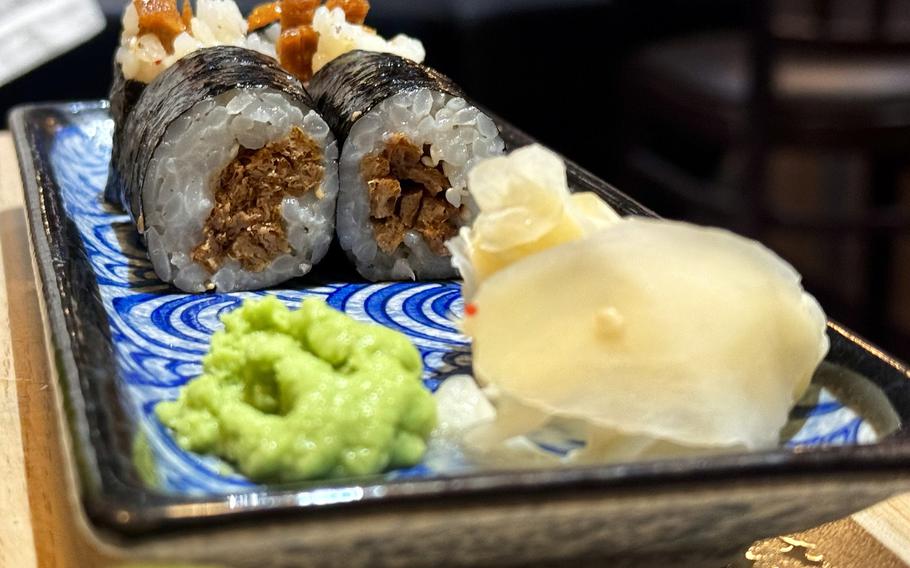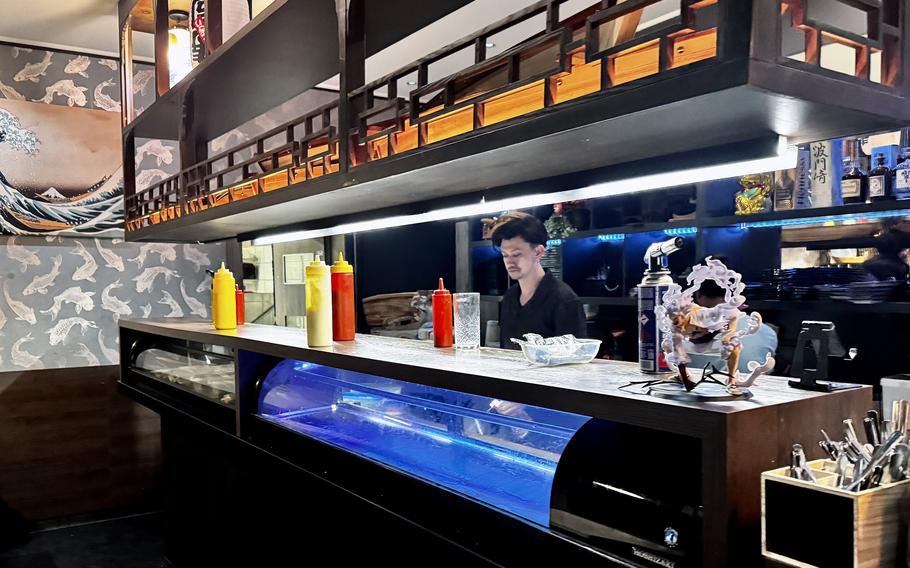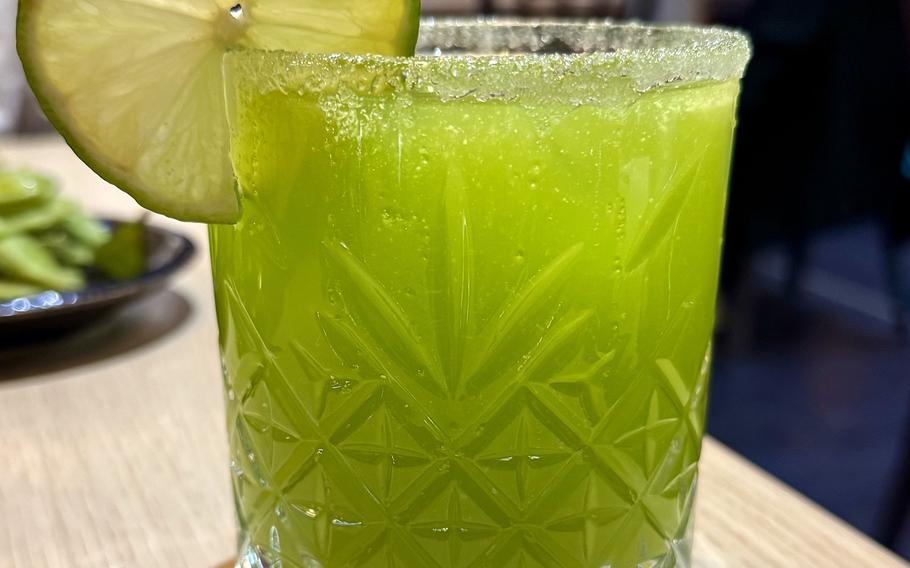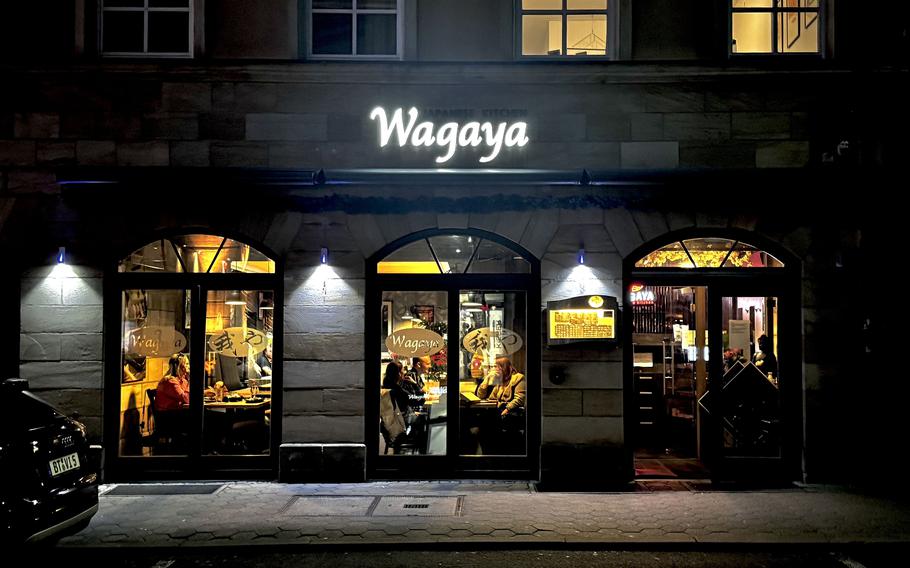
The small but mighty Inari Roll has a simple filling of pickled tofu and is a great vegetarian option. (Lydia Gordon/Stars and Stripes)
Sushi is probably the last dish I expected to find done well in a landlocked corner of Germany hundreds of miles from the nearest ocean.
But after residing in Germany for nearly a year, I set aside my bias — shaped by a few years spent in Japan — and gave Bayreuth’s Wagaya Japanese Kitchen a shot.
People who have lived a long time in both Japan and Germany say there is a scale of sorts for weighing sushi quality here, particularly outside the largest cities. First and foremost is the preparation of the rice, which can elevate or ruin a piece of sushi the same way bread quality affects a sandwich, if not more so.

Toward the kitchen of Wagaya Japanese Kitchen in Bayreuth, Germany, is the sushi bar, where meals are made to order. (Lydia Gordon/Stars and Stripes)
Secondarily, it’s Westernized, and that’s OK. The fish variety won’t be the same as along the Pacific Ocean, but items like tuna, salmon and octopus all unfreeze very nicely. There will be all manner of sauces and likely a few fried rolls never seen before in Tokyo.
I’ll admit, I was skeptical. A quick glance at the restaurant’s website listed multiple five-star reviews, with one calling it “the best sushi in town.”
The menu surprised me, though, not just with its size but also with its variety. Joined by my friend, a committed vegetarian, we were especially impressed by the number of sushi options that aligned with her diet.
The interior of the restaurant was warm and inviting, blending traditional and modern Japanese aesthetics. Small cherry blossom accents and soft pink neon lighting added charm without feeling overdone.
We started off the evening strong with a few appetizers: miso soup for her, fried gyoza for me and edamame to share.
It was a comforting return to the staples of Japanese cuisine — small dishes meant for sharing rather than the massive displays on oversized plates in traditional German fare.
As we worked our way through the appetizers, we found ourselves torn and tempted by the curry and other rice dishes on the menu, yet committed to the sushi.
In the end, we decided the sushi would be the determining factor. If it delivered, Wagaya would be worth a return trip to explore the rest of the menu.
For our main courses, I ordered the White Roll, which included a flavorful combination of tempura shrimp, cucumber, mango and cream cheese, finished with a drizzle of eel sauce and Japanese mayo.
Are you likely to find something like this anywhere in Japan? No. But it was a balance of sweet, savory and salty, so I was more than happy with my choice.
My friend opted for the Inari Roll, a simple yet satisfying maki made with pickled tofu. Inari is common in Japan, though rarely as maki.
Although I’m not typically a fan of most pickled foods, I stole a bite of her roll and was surprised by how much I liked it.
By that point, we’d already splurged on appetizers, main courses and an oddly green mochi highball, so we figured a little dessert couldn’t hurt.
The mochi mix caught my eye, while my friend opted for the fried hot bananas, another staple of the Westernized Japanese menu.
When both desserts arrived, they were accompanied by sliced apples and oranges. Mine was served with a whipped cream center, and hers was paired with vanilla ice cream drizzled in honey.
The mochi mix was delicious but tiny. The hot bananas, while enjoyable when combined with the ice cream and honey, didn’t quite stand out. Still, both desserts felt pleasantly light.

The mochi highball, a sweet mixed cocktail found at Wagaya Japanese Kitchen in Bayreuth, is an interesting rendition of a Japanese drink. (Lydia Gordon/Stars and Stripes)
While I still miss the convenience and quality of Japanese sushi in its home country, I’m looking forward to returning to Wagaya soon.
With such a broad menu and a decent bang for the buck, it gives me hope that I’ve found a reliable go-to for satisfying my Japanese food cravings.

Wagaya Japanese Kitchen in Bayreuth, Germany, offers an extensive menu with traditional Japanese offerings and more Westernized fare. (Lydia Gordon/Stars and Stripes)
Wagaya Japanese Kitchen Bayreuth
Address: Richard-Wagner-Strasse 31, Bayreuth, Germany
Hours: Sunday and Tuesday-Thursday, 11:30 a.m.-2:30 p.m. and 5-10 p.m.; Friday and Saturday, 11:30 a.m.-2:30 p.m. and 5-10:30 p.m.; closed Monday.
Cost: appetizers, 5-7 euros; sushi/nigiri/maki, 3-15 euros; entrees, 13-18 euros; dessert, 3-7 euros.
Information: Online: wagaya-restaurant.de; Phone: +49 921-7931-5111